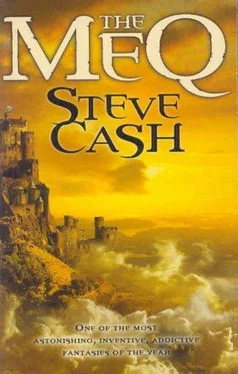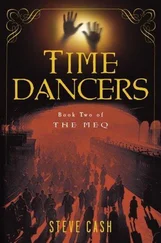Steve Cash - The Meq
Здесь есть возможность читать онлайн «Steve Cash - The Meq» весь текст электронной книги совершенно бесплатно (целиком полную версию без сокращений). В некоторых случаях можно слушать аудио, скачать через торрент в формате fb2 и присутствует краткое содержание. Год выпуска: 2005, Издательство: Del Rey, Жанр: Фэнтези, Детективная фантастика, ya, на английском языке. Описание произведения, (предисловие) а так же отзывы посетителей доступны на портале библиотеки ЛибКат.
- Название:The Meq
- Автор:
- Издательство:Del Rey
- Жанр:
- Год:2005
- ISBN:нет данных
- Рейтинг книги:4 / 5. Голосов: 1
-
Избранное:Добавить в избранное
- Отзывы:
-
Ваша оценка:
- 80
- 1
- 2
- 3
- 4
- 5
The Meq: краткое содержание, описание и аннотация
Предлагаем к чтению аннотацию, описание, краткое содержание или предисловие (зависит от того, что написал сам автор книги «The Meq»). Если вы не нашли необходимую информацию о книге — напишите в комментариях, мы постараемся отыскать её.
The Meq — читать онлайн бесплатно полную книгу (весь текст) целиком
Ниже представлен текст книги, разбитый по страницам. Система сохранения места последней прочитанной страницы, позволяет с удобством читать онлайн бесплатно книгу «The Meq», без необходимости каждый раз заново искать на чём Вы остановились. Поставьте закладку, и сможете в любой момент перейти на страницу, на которой закончили чтение.
Интервал:
Закладка:
“Well?” I said.
She laughed again. “What difference does that make?” she asked, and closed the door.
Two weeks later I was at sea, after traveling with Captain Woodget, as he now liked to be called, down the Mississippi by steamer to New Orleans and then to Biloxi by train. We slipped out in the dark of night by longboat and met the Clover, anchored in the Gulf about a mile out. We set sail for points south by southeast, headed for Key West, Nassau, and ports unknown.
The Clover was one of the last of its kind, nearly ninety yards long with miles of rigging and a well-drilled crew. Steamships were beginning to vie for trade with the clippers and the days of the great merchant sailing ships were numbered. Captain Woodget didn’t agree with this fact and never backed down from a challenge to race with one of the “tin crates,” as he called them.
He made sure that everyone on board understood I was his apprentice and not a cabin boy. No one ever doubted him and I was given free rein on the ship. He was a good captain, hard but fair, and he was an expert in sail-making, rigging, and navigation. He had the respect of every seaman on board and each one knew that things would be done one way — Captain Woodget’s — no matter how trivial it might seem.
I got my sea legs early and never got seasick, even crossing the Gulf Stream, which was rough. I made friends with many of the crew and most called me Z, but I also got a nickname from our Portuguese cook, who called me “Pequeño Basque,” or “Little Basque.”
Captain Woodget became a friend and helped me search for Sailor in every port, as long as I remembered my primary task, “watching his back.”
I loved the life at sea; the wind and the smell of the constant spray and the stars at night, ten million more than I’d seen when I woke up to the Milky Way in Colorado. I was kept busy most of the time, but I also had endless hours to think about Mama and Papa, Solomon, Ray, Georgia, and Carolina; people I had loved and somehow lost, much too quickly.
Time has a different pace at sea. Days turn into weeks and weeks into months so easily. It rolls under you and you sail through it as you would the sea itself. It is vast and broken only by the light, the weather, the next harbor, a memory of lost things. Sailor, if he existed, must have felt this way a thousand times, I thought.
I hadn’t found a trace of him. After Captain Woodget had taught me how and where to look, I talked to seamen of all colors and nations. I stopped and hounded dockworkers, barmaids, whores, kitchen cooks, anyone and everyone. Months went by, then a year, then two. My Meq blood and sensibilities concerning Time didn’t seem to notice; only my obsession with finding Sailor mattered. We took on cargoes of tea, wool, coal, jute, redwood, brown sugar, dyes; hundreds of different goods from hundreds of different ports. We anchored off West Africa, Brazil, Madagascar, Nova Scotia, Bermuda, the whole rim of the Atlantic and Indian oceans. Most of our cargoes were legal, but the Clover always had one hold, or at least part of one, filled with contraband, and a cabin was always available to the occasional revolutionary or murderer at a price. Holidays and birthdays were never celebrated; smuggling is mainly business and the demands on the men who do it are relentless and never romantic. Two years became four and four became eight. I saw Captain Woodget and most of his crew through two separate cholera outbreaks, where dozens died. I learned to speak bits of French, Spanish, and Portuguese, enough to ask, “Do you know a boy named Sailor?” But no one did. Twelve years passed and I was as lost as I’d been when I first went to sea; twelve years of searching I felt were wasted. I still wore the Stones, though I hadn’t had to use them, not once. Captain Woodget and the crew never mentioned how I looked the same. I was just “Little Basque,” another unexplained mystery of the sea.
Then we anchored in a cove on the coast of Bermuda, not in the main harbor, but near it. It was New Year’s Day 1896, and twelve years were about to feel like twelve seconds.
Captain Woodget and I came ashore after dark with his first and second mates. “This is a human cargo,” he said, “a job beneath me, but still worth the money.”
As we made our way up a rocky path, he told me we were transporting the mistress of Antoine Boutrain, a well-known captain of the French shipping firm Bourdes, to New Orleans.
“Seems the good captain has a beautiful and loving wife at home,” he said, “but he likes to have this one meet him in different ports around the world. She cannot sail with him, so this time she sails with us. He is a warped man, I tell you, probably from trading that damned Chilean nitrate, but he pays well and guess what more is in it, Z?”
“I think I know,” I said.
Captain Woodget stopped on the path and turned to look at me. It was dark all around us, but I could feel his eyes bearing down.
“What do you mean?”
“I don’t know,” I said, “I mean, I’m not sure, but then again, I am.”
“Damnit, Z, say what you mean!” he fumed.
“This woman,” I said, “this mistress you’re picking up, she has an entourage; two of them, two Basque like me, right?”
“Holy Trident and dammit to hell! How did you know that? Only Captain Boutrain told me and I told no one.”
I looked in Captain Woodget’s face. He knew me as well as anyone by now.
“I don’t know,” I said.
We left the rocky way and started on a path of sand between the seagrass and weeds. The ground leveled out. We could see the house ahead of us, alone and lit by candles, white against the black sky.
I heard the song first. The lonely notes. The ancient melody and words woven into the night. Two voices exchanging lines, sad lines in a forgotten language; singing, swelling, falling. I knew that language. It was Papa dying, singing Mama’s song.
Captain Woodget asked if I was all right. I nodded and we walked toward the house.
The captain introduced himself and his first and second mates to the mistress, whose name was Isabelle, and was ushered in. I hung back in the shadows. The singing had stopped, if it had even begun. I turned and made my way in the dark around the house to the rear, which sloped down through the marsh and rocks toward the Atlantic, a thousand yards away. I stood in the silence.
Then I felt them. I couldn’t hear them, but I felt them. I felt them closing in, coming nearer. I knew they would and they knew I would feel them. It was what we knew. It was knowledge I had never been taught, but now could never forget.
“I am Unai,” he said.
I turned to my left.
“I am Usoa,” she said.
I turned to my right.
I looked back and forth between them, our eyes exchanging greeting and welcome. They had come to within ten feet of me and never made a sound. They were both dressed in loose black trousers tucked into leather boots laced to the knees. They wore broad-collared cotton shirts and no jewelry, except that he had a necklace around his neck and she a priceless blue diamond in her pierced right ear. They looked like twins, and if they were twins, I could have been their triplet.
“I am Zianno,” I said.
“We know,” they said in unison.
“I heard you singing, I think. What is it?”
“It is an old Meq song,” Unai said, walking over to Usoa and taking her hand in his.
“It is about Home,” Usoa said, “and return, the longing for return.”
“It was beautiful, but I don’t know the language.”
“You will,” Unai said.
“It will come to you,” Usoa said.
“But how?”
“Be patient,” Unai said, “you have come a long way, Zianno. You are learning, believe me, but I should introduce myself formally. I am Unai Txori, Egizahar Meq, through the tribe of Caristies, protectors of the Stone of Silence.”
Читать дальшеИнтервал:
Закладка:
Похожие книги на «The Meq»
Представляем Вашему вниманию похожие книги на «The Meq» списком для выбора. Мы отобрали схожую по названию и смыслу литературу в надежде предоставить читателям больше вариантов отыскать новые, интересные, ещё непрочитанные произведения.
Обсуждение, отзывы о книге «The Meq» и просто собственные мнения читателей. Оставьте ваши комментарии, напишите, что Вы думаете о произведении, его смысле или главных героях. Укажите что конкретно понравилось, а что нет, и почему Вы так считаете.












